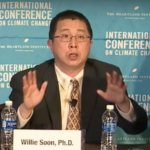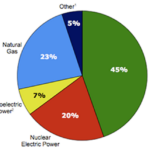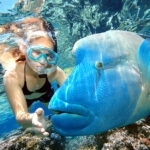Verbleking van koralen als gevolg van de opwarming van de aarde is een vast onderdeel van de litanie van milieuangsten van de klimaatalarmisten.
Eerder schonk ik aandacht aan berichten over de aftakeling van de Australische koraalriffen, die – zoals wij dat van klimaatalarmisten gewend zijn – voornamelijk wordt toegeschreven aan de opwarming van de aarde (die sinds zo’n 18 jaar stagneert) en/of verhoogde CO2-concentratie in de atmosfeer.
Onder de titel, ‘The Reef’s Self-Serving Saviours’, schreef Walter Starck in Quadrant een kritische analyse van wat er werkelijk aan de hand is en de stelselmatige desinformatie die over de toestand van het ‘Great Barrier Reef’ wordt verspreid.
All the many and varied claims of threats are based on speculation and the flat-out fabrications of researchers, bureaucrats and activists seeking grants and donations. Let us hope that a political leader emerges to decry and defund the gold-plated alarmists and the immense harm they are doing
Virtually every year for the past half-century news reports have bannered dire proclamations by “reef experts” on imminent “threats” to the Great Barrier Reef. This has sustained an ongoing, ever-growing charade of “research” and “management” aimed at saving the reef from a litany of hypothetical threats conjured up by a salvation industry which now costs taxpayers over $100 million annually. Although none of these “threats” have ever proven to be anything other than hypothetical possibilities or temporary fluctuations of nature, the doomsters never cease to rummage through their litany of concerns to find something they can present as urgent in order to keep the funding flowing.
For a time in the 1970s and ’80s genuine basic research was beginning to reveal a fascinating range of new understanding about the reef. Sadly, this all too brief golden age of discovery faded away when researchers found that the surest path to funding was to go with the flow and float their careers on the rising tide of environmentalism. We now have a whole generation of researchers whose entire involvement has been in the context of investigating various environmental concerns. Understandably, they perceive and/or present every fluctuation of nature as evidence of some threat. …
Zie verder hier.
Recent onderzoek wijst uit dat het weer de goede kant op gaat met het koraal. Onder de titel, ‘Great Barrier Reef starts to recover after severe coral bleaching, survey of sites between Cairns and Townsville shows’, schreef David Chen:
Optimism is rising among scientists that parts of the Great Barrier Reef that were severely bleached over the past two years are making a recovery.
Scientists from the Australian Institute of Marine Science this month surveyed 14 coral reefs between Cairns and Townsville to see how they fared after being bleached. The institute’s Neil Cantin said they were surprised to find the coral had already started to reproduce.
“We’re finding corals that are showing early signs of reproductive development, really visible eggs that we can see under the naked eye,” Dr Cantin said.
“[It’s] very surprising as previous studies have shown a two-to-three year delay in reproductive activity following bleaching events.
“It means they have enough energy, they’ve recovered the zooxanthellae and the symbiosis and they even have energy to invest in reproduction and egg development.”
Nearly two thirds of the Great Barrier Reef was affected by bleaching in 2016 and 2017, killing up to 50 per cent of coral in those parts.
Dr Cantin said scientists found eggs at most of the reefs in the Cairns region, including at Arlington Reef and Fitzroy Island. “What it means is the corals along the entire Great Barrier Reef, are survivors that are going to reproduce earlier than expected which could help drive quicker recovery if we don’t see another heat stress this summer,” he said. “This is a positive news story for a change for the Great Barrier Reef. We’re seeing eggs and we hope those eggs will lead to somewhat of a successful spawning season this summer.”
“What we really need to understand now is if these eggs that are produced will mature and lead to viable eggs that can form coral larvae,” Dr Cantin said.
Lees verder hier.
Alweer een sprookje minder.






Zo’n blog post is toch overbodig? Was het niet op het journaal? Stond het niet in de krant? Werd het niet van de daken gejuigd? De koralen zijn gereeed!! Lang leve de koralen.
Hoe zou het toch komen dat het altijd zo oorverdovend stil is als er eens goed nieuws is.
Het is goed te lezen dat het ook goed gaat met het koraal. Verder zijn er steeds meer berichten die de angel halen uit het alarmisme.
Gisteren liep ik op kantoor echter tegen een muur aan. En een nieuw probleem. Na mijn betoog kreeg ik dus de volgende opmerking “Maar we hebben al veel gedaan en we doen veel en waarschijnlijk gaat het daardoor weer wat beter. Dit is een bewijs dat we op de goede weg zitten met de vergroening en dus moeten we nog vastberadener doorgaan op de ingeslagen weg.”
Ik had het niet meer. Ik had hem daar ter plekke op zijn gezicht willen slaan. Gelukkig ben ik weggelopen.
Lijkt me erg onwaarschijnlijk of het nu ineens met koraal de goede kant op gaat. Ging het eigenlijk wel slecht met koraal of was het gewoon een cyclische degeneratie die thuishoort bij grote natuurlijke organismen ? We zullen het nooit weten, want historische, gedetailleerde en betrouwbare beschrijvingen van koraal hebben we niet.
Is typisch een product van de would-should-could industry, waarop we niet zitten te wachten. Samen met de Noordpool is de Great Barrier Reef een van de darlings van de klimaatindustrie om alarmistisch goed mee los te gaan. Je mag er vanuit gaan, dat de meeste onderzoeken flink gebiased en geframed zijn, om toekomstig onderzoeksgeld veilig te stellen met de eenvoudige, geïnteresseerde wetenschapsconsument als slachtoffer.
Het zou mooi zijn als de invloed van verzuring van het oceaanwater meevalt.
Het onderwerp is hier eerder ter sprake geweest, naar aanleiding van een actie van Greenpeace in Australië. Maar die had als je het na ging zoeken voor een belangrijk deel te maken met de uitbreiding van kolenhavens aan de oostkust. Mogelijk is de verstorende invloed van de aanleg van de havens nu voorbij. Blijft wel de toegenomen scheepvaart in het gebied, als die tenminste op gang is gekomen.
Bart,
Ik heb het al eerder uitgelegd, maar ik zal het nogmaals herhalen: de geleerden zijn het er vrijwel allemaal over eens dat de recente “verzuring” van het oceaanwater geen effect heeft op de verbleking van het koraal.
…..What it means is the corals along the entire Great Barrier Reef, are survivors that are going to reproduce earlier than expected which could help drive quicker recovery if we don’t see another heat stress this summer,” he said. “
Nou maar hopen dat er geen warme zomer komt!
http://www.smh.com.au/environment/weather/how-twin-bursts-of-unprecedented-earlyseason-heat-scorched-eastern-australia-20171003-gyttd7.html
De voortekenen zijn niet gunstig, maar ja dan schrijft @Hans gewoon weer een artikeltje dat de meetresultaten niet kloppen in Australie. Zo is er altijd wel wat te schrijven
Soort van catastrofale zure regen, uitstervende ijsberen, smeltende Himalaya, ijsvrije Kilimanjaro, groeiend ozongat, Sahara uitbreiding, klimaatvluchtelingen, toendra ontdooiing, verdwenen warmte, etc. Straks claimen de klimaatalarmisten dat de Kyoto-klimaatmaatregelen het effect van bijna 20 jaar geen significante opwarming heeft bewerkstelligd.
Scheffer, de hiatus is natuurlijk aan Kyoto te danken. Dat kan niet anders, een andere verklaring is er niet.
In deze film zie je na 23 minuten een wetenschappelijk verslag.
https://www.youtube.com/watch?v=yIi1b17HKF8